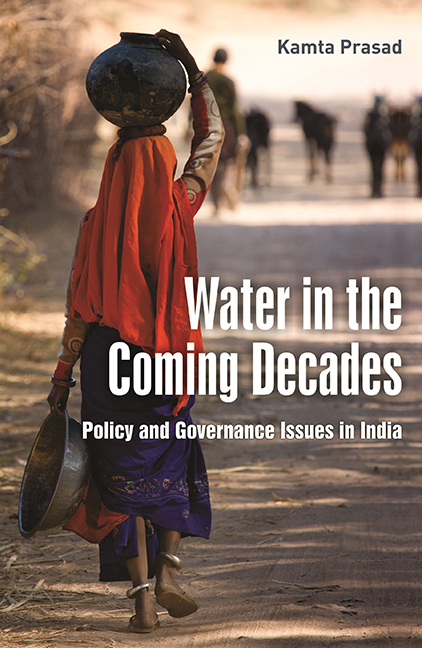Book contents
- Frontmatter
- Dedication
- Contents
- List of Tables
- List of Abbreviations
- Preface
- Acknowledgements
- Section I Overall Perspectives
- Section II Situational Analysis
- Section III Socio-economic, Institutional and Environmental Aspects
- Section IV Technological Options
- Section V Concluding Observations
- References
- Index
17 - Environmental Concerns and Policy Response
Published online by Cambridge University Press: 13 July 2022
- Frontmatter
- Dedication
- Contents
- List of Tables
- List of Abbreviations
- Preface
- Acknowledgements
- Section I Overall Perspectives
- Section II Situational Analysis
- Section III Socio-economic, Institutional and Environmental Aspects
- Section IV Technological Options
- Section V Concluding Observations
- References
- Index
Summary
Environmental aspects are becoming important in the management and development of water resources in the world, including India. These aspects are examined in this chapter. After providing a glimpse of the growing environmental awareness, the chapter examines policy measures comprising environmental clearance process, safeguards and monitoring taken in recent years in this connection. This is followed by a few examples of the supportive role of court judgements. The chapter ends with a fairly detailed and exhaustive discussion on the adequacy of the measures adopted so far, drawing attention to the limitations of data and methodology, the institutional inadequacies and the problem of non-compliance. The chapter also provides suggestions for improvement.
Growing environmental awareness in India
There has been a new and growing awareness in India with respect to environment, sustainability and human aspects. Not long ago, it was generally believed that nature's bounty is inexhaustible to be enjoyed endlessly. Sustainability issues, therefore, raised little concern. Effluents were routinely discharged into rivers or lakes with hardly a thought about their future. Environmental degradation had been taking place for decades. But, these environmental issues were given peripheral treatment. Easy solutions were found at the cost of the environment. Limited magnitude of the problems within tolerable limits and the consequent lack of awareness were partly responsible for this attitude. Even the Second Irrigation Commission's report (1972) was mainly concerned with matters relating to technical and administrative aspects, with hardly a word about social and environmental issues. Planners of yesteryears obviously could not foresee the emerging adverse environmental impacts of programmes of development initiated by them from 1951 when the First Five Year Plan (FYP) was launched. This was, of course, a worldwide phenomenon.
Environmental issues, however, started receiving increasing attention from the 1970s. The United Nations Conference on the Human Environment held in Stockholm in 1972 gave a great push to this awareness. It emphasized the need for preserving and safeguarding natural resources which was a change from the traditional approach of their exploitation. The subsequent FYPs and government reports in India started giving increasing recognition to the need for sustainable development and protection of environment.
- Type
- Chapter
- Information
- Publisher: Foundation BooksPrint publication year: 2014



